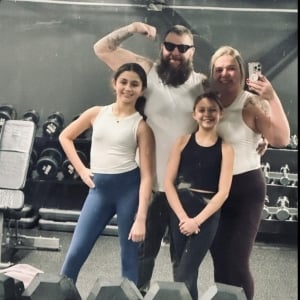Title: A New Vision
Title: A New Vision
At 43, Andrew was living a life many would envy—a great job, his family was well-established, and he felt the world was at his feet. But when he began noticing the world around him blurring, at first, it seemed like a minor inconvenience. Maybe a few more eye exams would clear things up. However, the diagnosis came as a crushing blow, throwing his world off balance: he was losing his vision.
Retinopathy - damage to the retina, the light-sensitive tissue at the back of the eye. This condition can affect vision and, in severe cases, lead to blindness. It took his sight faster than he could have imagined, and left Andrew fully blind.
The initial grief was overwhelming. The person he thought he was seemed to vanish, replaced by someone struggling to navigate a world that felt less and less familiar. Everyday tasks he once took for granted—cooking, reading, shopping, walking—became daunting challenges. Andrew wrestled with his identity, asking himself: Who was he now? What was left of him? What could he still do?
At the Carroll Center, Andrew was introduced to a community of people who, like him, were blind or had low vision. They weren’t waiting for the world to pity them or “make things easier.” Instead, they were learning to adapt, reclaim control, and live independent, fulfilling lives. The instructors at the center didn’t just teach mobility and technology—they taught how to regain confidence, rebuild a sense of self, and rise above the overwhelming challenge.
The center’s mobility training helped Andrew become confident with a white cane—a tool that allowed him to navigate unfamiliar places with ease. It wasn’t about being “less than” anyone else; it was about finding the skills to interact with the world in a way that worked for him.
Alongside this, Andrew was introduced to technology—screen readers, voice-activated apps, and smart devices—that opened up an entirely new world. Tasks like cooking became easier with voice-activated timers and appliances that he could control by touch. Professional work became possible with accessible software that read documents aloud. Technology wasn’t just a crutch; it was a bridge that connected Andrew to his old passions and career.
Perhaps most importantly, Andrew learned a profound truth: blindness isn’t who you are—it’s simply one aspect of how you interact with the world. Who Andrew was—and still is—is the same vibrant, intelligent, and capable person he’s always been. The only difference now is that he approaches life from a new angle, using tools, skills, and a fresh perspective.
The Carroll Center played a crucial role in changing perceptions, helping people understand that blindness or low vision doesn’t equal weakness. It means adaptation, resilience, and a willingness to embrace new challenges. The center wasn’t just teaching technical skills—it was cultivating an attitude of capability, where the person was seen first, not their disability. Through this, Andrew learned that blindness wasn’t his identity; it was simply an obstacle, one that he had the tools to overcome.
Andrew hopes that by sharing his story, others will see that blindness is not a reason to feel diminished. It’s simply a way of interacting with the world—a world where, with the right support, anyone can thrive. He’s proud to live a life filled with independence, purpose, and love, surrounded by his supportive family who reminds him every day that blindness is just one chapter of his incredible journey.
Blindness is not WHO a person is—it’s just one part of their journey. And with the right support, vision loss doesn’t have to be an obstacle to living the life you’ve always dreamed of.
 0
0




